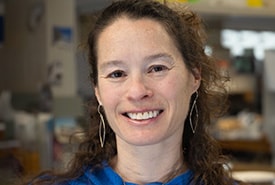At a glance
Meet flu fighter Maurine Neiman, who lost her 2-year-old son, JJ, to flu. Maurine has made it part of her mission to understand the scientific research on flu and flu vaccination to share with colleagues, friends, and family.

How has flu impacted you personally? Why do you fight flu?
My nearly 3-year-old son JJ died suddenly only 12 hours after developing mild flu symptoms. He had been vaccinated that season, but flu vaccines (like other vaccines) aren’t 100 percent effective. Vaccination helps protects us as individuals, as well as the people around us. Because flu vaccination rates are less than what’s needed to support community immunity, it leaves vulnerable individuals in our communities – like young children – at risk of getting sick and potentially having severe flu-related outcomes. JJ’s story illustrates what can happen when vaccination levels are well below what they need to be to keep vulnerable members of our community safe. Vaccination is not just about protecting yourself; it’s also about protecting your community too.
How do you fight flu?
As a research scientist and parent, I understand the value of getting vaccinated to help protect myself, my loved ones, and my community. I, along with my family members, get a flu vaccine each and every season. As a parent and community member, I also know it's important to stay home when sick to avoid exposing others and help lessen the spread of disease. Since JJ lost his life, I made it part of my mission to understand the scientific research on flu and flu vaccination – and I share that information with my colleagues, friends, and family. I also fight flu through my advocacy work with Vaccinate Your Family's SQUAD™.
What would you say to those who are hesitant about getting a flu vaccine?
Flu vaccines are safe and the best way we can help protect ourselves and our community from a potentially deadly disease. I would tell them JJ’s story, remind them that what happened to him could happen to anyone, and that if more people in the community had been vaccinated, he might still be alive today because he might not have gotten sick to begin with.
What do you want others to learn from your experience with flu?
Vaccines exist for a reason: we might no longer fear potentially deadly diseases like flu and measles and not worry about them so much anymore because vaccines are effective. We have forgotten that these diseases can kill. I want others to internalize the notion that vaccines protect communities, not just individuals. Each of us plays a role in protecting public health.
To read JJ's full story, visit www.vaccinateyourfamily.org/jj.
